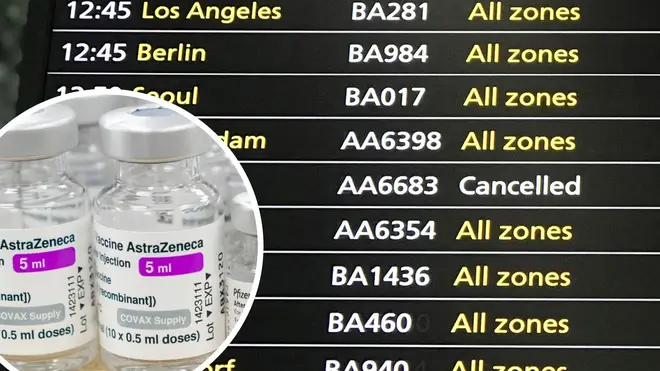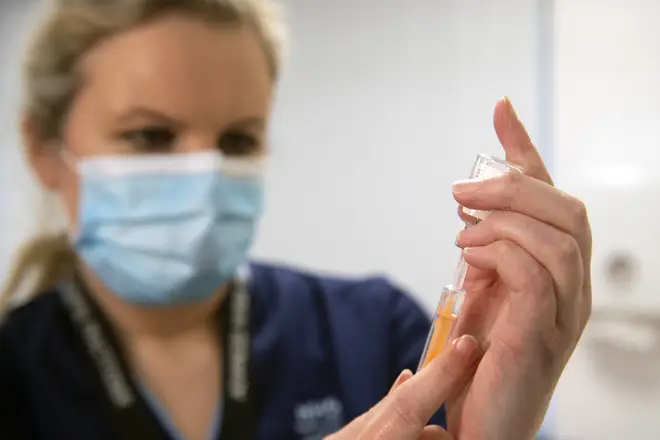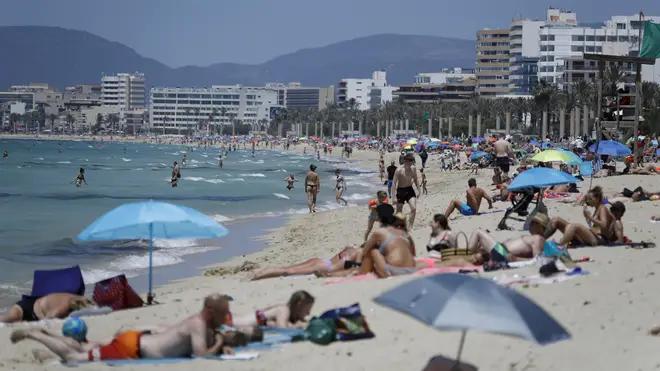
James O'Brien 10am - 1pm
2 July 2021, 16:05 | Updated: 2 July 2021, 16:09

Millions of Brits face being prevented from flying to Europe on holiday as the EU launches its new vaccine approval scheme.
One UK vaccines expert described the issue as an "administrative hurdle" which should be "straightened out in due course" but it has left hundreds of thousands of holidaymakers concerned about their plans.
As the EU begins the rollout of its a Digital Covid Certificate, the status of some specific doses are now coming into focus as travellers are asked prove their vaccination status to exempt them from quarantining.
But which batches of the AstraZeneca vaccine are affected? Why has the EU not approved them?

As the EU begins the rollout of its a Digital Covid Certificate, the status of some specific doses are now coming into focus as travellers are asked prove their vaccination status to exempt them from quarantining.
Batches 4120Z001, 4120Z002, 4120Z003 are could all be affected by new EU travel rules.
To find out what batch you've had, check your vaccination card - it should be written on there.
The doses, also known as Covishield, are being produced by the Serum Institute of India which the bloc is yet to approve - despite it being identical to the AstraZeneca vaccine being made elsewhere.
The UK Government has also said it remains unclear whether Brits will be asked to use the NHS app or another in order to prove their vaccination status, prompting fears any travel scheme could leave behind those without the right technology.
The NHS app is already being accepted by individual countries including Spain and Greece.
READ MORE: Brits who received Indian-made AstraZeneca jabs ‘could be barred from visiting Europe’

An "administrative hurdle" is being blamed for the EU not approving the specific batches.
Despite it being the same as other AstraZeneca doses, it has not been authorised by Europe's regulator and is therefore not recognised by the bloc.
There is no suggestion the batches are any less effective or there are any dangers to taking it.
A European Commission spokesman said "entry into the EU should be allowed to people fully vaccinated with one of the vaccines authorised in the EU".
He added that individual member states could also allow entry for people vaccinated with jabs on the World Health Organisation's emergency list.
"This is the case for Covishield which is not authorised for placing on the market in the EU," he added.
READ MORE: Germany to allow fully vaccinated Brits to visit without quarantine 'in foreseeable future

Downing Street has said the UK's Medicines and Healthcare products Regulatory Agency (MHRA) has shared its assessment of the vaccines with its counterpart at the European Medicines Agency (EMA) to assist the approvals process.
A No10 spokesman said: "They're the same product which has been authorised and checked for safety and quality by our MHRA.
"They've shared their inspection report with the EMA."
Britain is currently in talks with Brussels about easing travel restrictions between the UK and the continent, discussions which EU sources described as going "in the right direction".
Professor Adam Finn, from the Government's Joint Committee on Vaccination and Immunisation (JCVI), said the batches are "exactly the same stuff" and warned against creating "hurdles that don't need to be there".
Boris Johnson later on Thursday said he was confident the issue would not prevent millions of Brits going abroad but could not offer a conclusive answer.